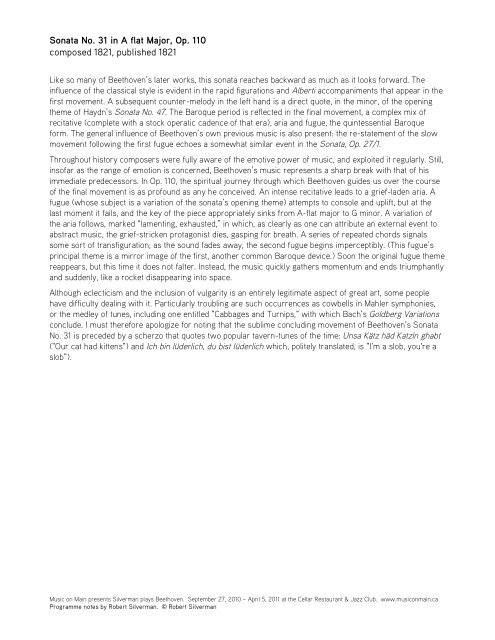beethoven's 32 piano sonatas robert silverman - Music on Main
beethoven's 32 piano sonatas robert silverman - Music on Main
beethoven's 32 piano sonatas robert silverman - Music on Main
Create successful ePaper yourself
Turn your PDF publications into a flip-book with our unique Google optimized e-Paper software.
S<strong>on</strong>ata No. 31 in A flat Major, Op. 110<br />
composed 1821, published 1821<br />
Like so many of Beethoven’s later works, this s<strong>on</strong>ata reaches backward as much as it looks forward. The<br />
influence of the classical style is evident in the rapid figurati<strong>on</strong>s and Alberti accompaniments that appear in the<br />
first movement. A subsequent counter-melody in the left hand is a direct quote, in the minor, of the opening<br />
theme of Haydn’s S<strong>on</strong>ata No. 47. The Baroque period is reflected in the final movement, a complex mix of<br />
recitative (complete with a stock operatic cadence of that era), aria and fugue, the quintessential Baroque<br />
form. The general influence of Beethoven’s own previous music is also present: the re-statement of the slow<br />
movement following the first fugue echoes a somewhat similar event in the S<strong>on</strong>ata, Op. 27/1.<br />
Throughout history composers were fully aware of the emotive power of music, and exploited it regularly. Still,<br />
insofar as the range of emoti<strong>on</strong> is c<strong>on</strong>cerned, Beethoven’s music represents a sharp break with that of his<br />
immediate predecessors. In Op. 110, the spiritual journey through which Beethoven guides us over the course<br />
of the final movement is as profound as any he c<strong>on</strong>ceived. An intense recitative leads to a grief-laden aria. A<br />
fugue (whose subject is a variati<strong>on</strong> of the s<strong>on</strong>ata’s opening theme) attempts to c<strong>on</strong>sole and uplift, but at the<br />
last moment it fails, and the key of the piece appropriately sinks from A-flat major to G minor. A variati<strong>on</strong> of<br />
the aria follows, marked “lamenting, exhausted,” in which, as clearly as <strong>on</strong>e can attribute an external event to<br />
abstract music, the grief-stricken protag<strong>on</strong>ist dies, gasping for breath. A series of repeated chords signals<br />
some sort of transfigurati<strong>on</strong>; as the sound fades away, the sec<strong>on</strong>d fugue begins imperceptibly. (This fugue’s<br />
principal theme is a mirror image of the first, another comm<strong>on</strong> Baroque device.) So<strong>on</strong> the original fugue theme<br />
reappears, but this time it does not falter. Instead, the music quickly gathers momentum and ends triumphantly<br />
and suddenly, like a rocket disappearing into space.<br />
Although eclecticism and the inclusi<strong>on</strong> of vulgarity is an entirely legitimate aspect of great art, some people<br />
have difficulty dealing with it. Particularly troubling are such occurrences as cowbells in Mahler symph<strong>on</strong>ies,<br />
or the medley of tunes, including <strong>on</strong>e entitled "Cabbages and Turnips," with which Bach's Goldberg Variati<strong>on</strong>s<br />
c<strong>on</strong>clude. I must therefore apologize for noting that the sublime c<strong>on</strong>cluding movement of Beethoven's S<strong>on</strong>ata<br />
No. 31 is preceded by a scherzo that quotes two popular tavern-tunes of the time: Unsa Kätz häd Katzln ghabt<br />
("Our cat had kittens") and Ich bin lüderlich, du bist lüderlich which, politely translated, is "I'm a slob, you're a<br />
slob").<br />
<str<strong>on</strong>g>Music</str<strong>on</strong>g> <strong>on</strong> <strong>Main</strong> presents Silverman plays Beethoven. September 27, 2010 – April 5, 2011 at the Cellar Restaurant & Jazz Club. www.music<strong>on</strong>main.ca<br />
Programme notes by Robert Silverman. © Robert Silverman


